Related Research Articles

The Pavo-Indus Supercluster is a neighboring supercluster located about 60–70 Mpc (196–228 Mly) away in the constellations of Pavo, Indus, and Telescopium. The supercluster contains three main clusters, Abell 3656, Abell 3698, and Abell 3742.

The Hercules Superclusters refers to a set of two nearby superclusters of galaxies.
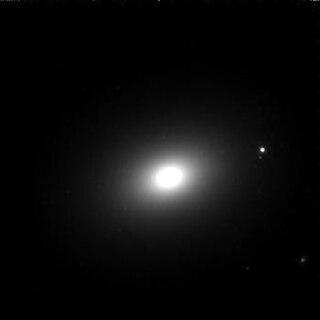
NGC 7014 is an elliptical galaxy located about 210 million Light-years away from Earth in the constellation Indus. NGC 7014 was discovered by English astronomer John Herschel on October 2, 1834.

NGC 7038 is an intermediate spiral galaxy located about 210 million light-years away in the constellation of Indus. NGC 7038 was discovered by astronomer John Herschel on September 30, 1834.
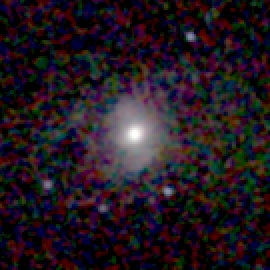
NGC 7060 is an intermediate spiral galaxy located about 200 million light-years away in the constellation of Microscopium. The spiral arms of NGC 7060 appear to overlap. NGC 7060 was discovered by astronomer John Herschel on September 2, 1836.
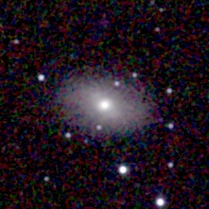
NGC 7079 is a barred lenticular galaxy located about 110.58 million light-years away in the constellation of Grus. NGC 7079 is also classified as a LINER galaxy. It is tilted about 51° to the Earth's line of sight. NGC 7079 was discovered by astronomer John Herschel on September 6, 1834.

NGC 498 is a lenticular galaxy located about 260 million light-years away from Earth, in the constellation Pisces. NGC 498 was discovered by astronomer R. J. Mitchell on October 23, 1856.

NGC 6039 is a massive lenticular galaxy located about 460 million light-years away in the constellation Hercules. NGC 6039 was discovered by astronomer Édouard Stephan on June 27, 1870 and later rediscovered by astronomer Lewis Swift on June 27, 1886. NGC 6039 is member of the Hercules Cluster, which is part of the CfA2 Great Wall.

ESO 444-46 is a giant elliptical galaxy located about 640 million light-years away in the constellation Centaurus. It is the brightest member of the galaxy cluster Abell 3558 which lies in the center of the Shapley Supercluster.
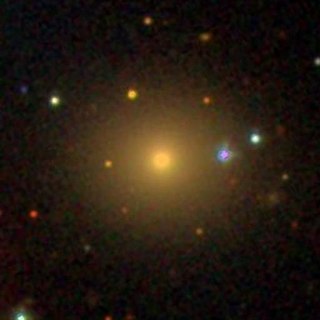
NGC 1259 is a lenticular galaxy located about 243 million light-years away in the constellation Perseus. The galaxy was discovered by astronomer Guillaume Bigourdan on October 21, 1884 and is a member of the Perseus Cluster.

NGC 1273 is a lenticular galaxy located about 245 million light-years away in the constellation Perseus. It was discovered by astronomer Heinrich d'Arrest on February 14, 1863 and is a member of the Perseus Cluster.
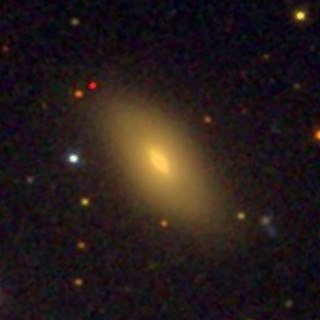
NGC 1274 is a compact elliptical galaxy located about 280 million light-years away in the constellation Perseus. NGC 1274 was discovered by astronomer Lawrence Parsons on December 4, 1875. It is a member of the Perseus Cluster.

NGC 1282 is an elliptical galaxy located about 230 million light-years away in the constellation Perseus. It was discovered by astronomer Guillaume Bigourdan on October 23, 1884. NGC 1282 is a member of the Perseus Cluster.

NGC 1283 is an elliptical galaxy located about 250 million light-years away in the constellation Perseus. The galaxy was discovered by astronomer Guillaume Bigourdan on October 23, 1884 and is a member of the Perseus Cluster. It also contains an active galactic nucleus.

NGC 1293 is an elliptical galaxy located about 215 million light-years away in the constellation Perseus. It was discovered by astronomer William Herschel on October 17, 1786. NGC 1293 is a member of the Perseus Cluster.

NGC 3840 is a spiral galaxy located about 320 million light-years away in the constellation Leo. The galaxy was discovered by astronomer Heinrich d'Arrest on May 8, 1864. NGC 3840 is a member of the Leo Cluster. The galaxy is rich in neutral atomic hydrogen and is not interacting with its environment.

NGC 3558 is an elliptical or a lenticular galaxy located 440 million light-years away in the constellation Ursa Major. It was discovered by the astronomer Heinrich d'Arrest on April 15, 1866. It is a member of the galaxy cluster Abell 1185 and is classified as a LINER galaxy.

NGC 703 is a lenticular galaxy located 240 million light-years away in the constellation Andromeda. The galaxy was discovered by astronomer William Herschel on September 21, 1786 and is also a member of Abell 262.

NGC 709 is a lenticular galaxy located 150 million light-years away in the constellation Andromeda. It was discovered by the Irish engineer and astronomer Bindon Blood Stoney on October 28, 1850 and is a member of the galaxy cluster Abell 262.

NGC 717 is a lenticular galaxy located 210 million light-years away in the constellation Andromeda. The galaxy was discovered by astronomer Bindon Blood Stoney on October 28, 1850 and is a member of Abell 262.
References
- 1 2 3 4 5 6 7 8 "NASA/IPAC Extragalactic Database". Results for Abell 3742. Retrieved 2018-01-26.
- ↑ "Your NED Search Results". ned.ipac.caltech.edu. Retrieved 2018-01-26.
- ↑ Ford, Dominic. "The galaxy cluster Abell 3742 - In-The-Sky.org". in-the-sky.org. Retrieved 2018-01-26.
- ↑ "Detailed Object Classifications". ned.ipac.caltech.edu. Retrieved 2018-01-26.
- ↑ "The Pavo-Indus Supercluster". www.atlasoftheuniverse.com. Retrieved 2018-01-26.